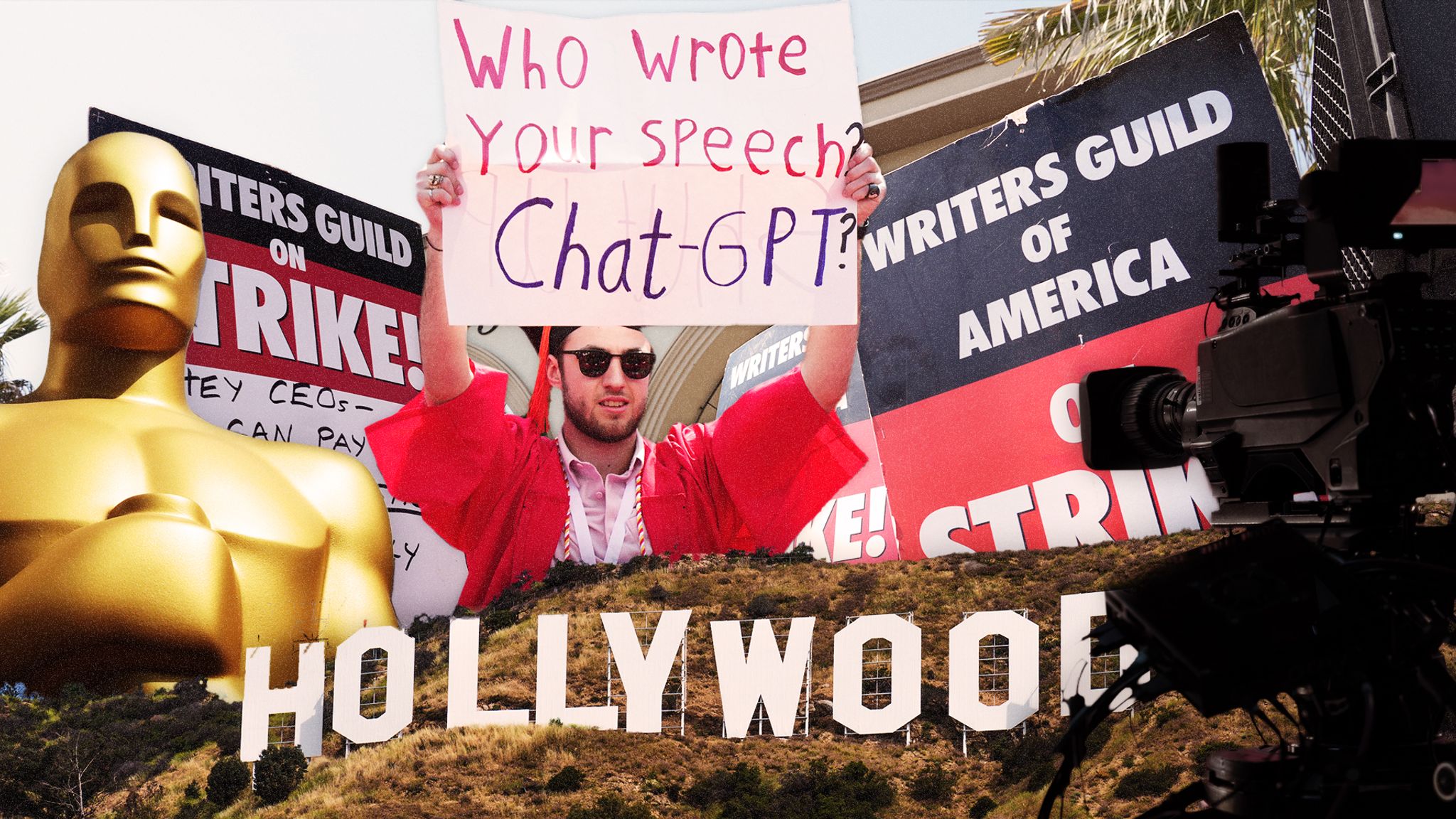Hollywood At A Halt: The Combined Writers And Actors Strike

Table of Contents
The Writers Guild of America (WGA) Strike: Core Issues
The WGA strike, a significant component of the larger Hollywood strike, centers around several key issues threatening the livelihoods and creative freedom of writers.
Fair Wages and Residuals in the Streaming Era
The rise of streaming services has fundamentally altered the television and film landscape, significantly impacting writers' compensation. The traditional model of revenue sharing, which provided writers with residuals based on a show's success, has been largely replaced by upfront fees, often significantly lower than what writers previously earned. This disparity is a major point of contention in the Hollywood strike.
- Decline in residuals for streaming shows: Streaming platforms often pay a flat fee, regardless of a show's viewership or longevity. This contrasts sharply with the previous system where writers received ongoing payments based on syndication and repeat broadcasts.
- Demand for fairer profit-sharing agreements: The WGA is pushing for a return to a more equitable system that reflects the ongoing value and success of their work in the streaming era. They argue that writers should share in the profits generated by their shows, especially given the significant revenue generated by streaming services.
- Concerns about the sustainability of a writing career in the current landscape: The reduced compensation and lack of residuals make it increasingly difficult for writers to sustain themselves, threatening the long-term health and sustainability of the writing profession.
Protecting Writers' Rights and Creative Control
Beyond compensation, the WGA strike addresses concerns about creative control, the increasing use of AI in writing, and minimum staffing levels on productions. These issues are critical to maintaining the quality and integrity of storytelling in the industry.
- Concerns about the use of AI to replace writers: The WGA is deeply concerned about the potential displacement of human writers by AI writing tools. They argue for safeguards to protect writers’ jobs and ensure that human creativity remains central to the storytelling process.
- Demands for minimum staffing levels on productions: Insufficient staffing levels compromise the quality of writing and production, creating an unsustainable work environment for writers. The WGA is advocating for minimum staffing levels to ensure adequate time and resources for creating quality content.
- Fighting for greater creative autonomy: Writers are demanding greater creative control over their work, asserting their right to participate meaningfully in the creative process and protect their intellectual property.
The SAG-AFTRA Strike: Joining Forces and Shared Concerns
SAG-AFTRA's decision to join the WGA on the picket lines significantly escalated the Hollywood strike, demonstrating a united front against the industry's practices. Many concerns overlap with the WGA's, but SAG-AFTRA also brings its unique perspectives to the negotiation table.
Fair Compensation and Working Conditions
SAG-AFTRA shares the WGA's concerns regarding fair compensation in the streaming era, but also highlights issues specific to actors, particularly concerning the widespread use of self-tape auditions.
- Demands for increased minimum pay and residuals: Similar to writers, actors also seek increased minimum pay and a fairer system of residuals, reflecting the success of their work on streaming platforms.
- Concerns about the impact of AI on actors' work: The potential use of AI to generate digital replicas of actors raises serious concerns about job security and the exploitation of actors' likenesses.
- Addressing the exploitation of actors through self-tape auditions: The rise of self-tape auditions, while convenient for studios, often leads to unpaid work for actors, further exacerbating existing inequalities. SAG-AFTRA is pushing for regulations to ensure fair compensation for this work.
The Impact of AI on the Future of Acting
The use of artificial intelligence (AI) is a critical element of the Hollywood strike, impacting both writers and actors. The potential for AI to replace human talent is a major concern for both unions.
- Concerns about the misuse of actors' likenesses: The technology to create digital replicas of actors raises concerns about the unauthorized use of actors' likenesses and the potential loss of control over their image.
- Demands for regulations on the use of AI in the industry: Both unions are demanding regulations to prevent the misuse of AI and protect the jobs of human creatives.
- Protecting actors' job security in a rapidly changing landscape: The pervasive influence of AI poses a significant threat to actors' job security and necessitates proactive measures to mitigate the risk.
The Ripple Effect: Impact on the Entertainment Industry
The combined WGA and SAG-AFTRA strike, often called the Hollywood strike, has had a profound and far-reaching impact on the entertainment industry and beyond.
Production Delays and Cancelled Projects
The Hollywood strike has caused significant disruptions to film and television production, leading to widespread delays and cancellations. This has resulted in substantial financial losses for studios and production companies and created uncertainty for countless workers.
- Postponement of film and television productions: Numerous projects have been indefinitely delayed, impacting release schedules and creating uncertainty for the entire production pipeline.
- Financial losses for studios and production companies: The standstill in production represents significant financial losses for studios, production companies, and investors.
- Uncertainty for actors, writers, and crew members: The strike has created significant uncertainty and financial hardship for actors, writers, and all members of the production crew.
Economic Impact on Related Industries
The effects of the Hollywood strike extend beyond the entertainment industry itself, impacting related businesses and the wider economy.
- Job losses in related industries: Industries like catering, transportation, and local businesses that rely on film and television production are experiencing job losses and economic hardship.
- Economic downturn in communities dependent on film production: Communities heavily reliant on film and television production are facing an economic downturn, with knock-on effects throughout their local economies.
- Ripple effect on the wider economy: The broader economic consequences of the Hollywood strike are still unfolding, but the impact is likely to be felt beyond the immediate entertainment sector.
Conclusion
The Hollywood strike, encompassing both the WGA and SAG-AFTRA, represents a pivotal moment in the entertainment industry. The core issues of fair compensation, working conditions, and the impact of AI are crucial for the future of creative professionals. The prolonged standstill highlights the need for significant changes in how the industry operates, especially in the age of streaming. The resolution of the Hollywood strike will have lasting implications, shaping the landscape of film and television for years to come. Staying informed about the negotiations and the eventual outcome of the Hollywood strike is crucial for anyone interested in the future of the entertainment industry. Understanding the intricacies of this Hollywood strike is critical to comprehending the future of filmmaking and television.

Featured Posts
-
 Gebrakan Baru Rm Bts Nominasi Artis K Pop Favorit Amas 2025
May 30, 2025
Gebrakan Baru Rm Bts Nominasi Artis K Pop Favorit Amas 2025
May 30, 2025 -
 Entradas Bad Bunny Conciertos Madrid Y Barcelona Preventa Live Nation
May 30, 2025
Entradas Bad Bunny Conciertos Madrid Y Barcelona Preventa Live Nation
May 30, 2025 -
 Ticketmaster Venue Virtual Para Una Experiencia De Compra Superior
May 30, 2025
Ticketmaster Venue Virtual Para Una Experiencia De Compra Superior
May 30, 2025 -
 Manchester United Star Bruno Fernandes Al Hilals Bid And Potential Move
May 30, 2025
Manchester United Star Bruno Fernandes Al Hilals Bid And Potential Move
May 30, 2025 -
 Brooke Shields Aging Gracefully And The Agassi Relationship
May 30, 2025
Brooke Shields Aging Gracefully And The Agassi Relationship
May 30, 2025
